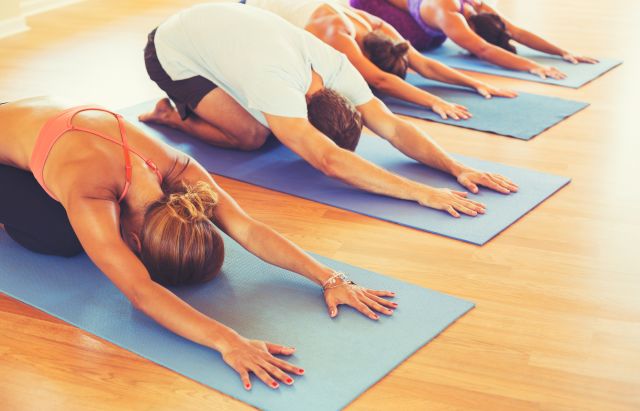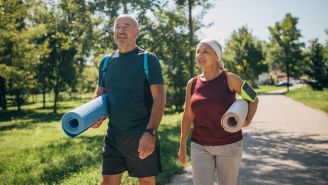After a heart attack, it can be hard to regain trust in your heart, and for that matter, your entire body. Even though you may have overlooked the care of your body in the past and feel afraid of the future, it’s important to focus on rebuilding a trusting, compassionate and healthy relationship with your heart.
Ornish Lifestyle Medicine gives you the tools to do just that. It’s a process of befriending and rebuilding trust and compassion for your body. Paying attention to our nutrition, fitness and relationships all play an important role in finding our way back to health. There are also important stress management techniques that offer us powerful tools for trusting our bodies and mending and befriending our hearts.
Foster Deep Listening
When we step onto our yoga mat, we also step into a relationship with our body that is focused on deep listening and conscious responding. We start to pay attention to our body’s language and we become an advocate for that voice by honoring what it’s telling us about ourselves.
Tools For Listening:
Move More Slowly in Your Postures
This is so you can hear and feel what the body is saying. If we move too quickly, we can get lost in letting our mind overpower, or even bully, our body into a position. When we slow down we are better able to listen to that first small signal that tells us we are nearing our edge of discomfort. When we notice that edge, we can pause to see if we can maintain our breathing and balance. Then we can ask ourselves these questions:
- “Should I pull back a little or is there room for me to soften right where I am?”
- “Is there anything I am willing to let go of (physical or emotional) that isn’t necessary for the maintenance of this pose?”
- “Could I stay here and breathe or does it feel better to come out just a little?”
- “If there is a way to let go, does it allow me to move in just a little deeper to the next edge, or is staying here on this edge enough?”
We must ask and we must listen. As we develop the conversation with our own bodies, we start to trust what it is telling us and we begin to honor the intelligence and wisdom it offers. We not only honor our body, but we may even expand our capacities in a gentle way. We move on the mat with this awareness and wisdom, and we can then bring these methods to our lives off the mat by learning to respect and honor our limits and capacities.
Talk to Your Heart
We can do this anytime and anywhere, but it may be most effective when we are lying down or sitting quietly with our eyes closed. This is when our body can relax and our mind rests in our heart. In our gentlest internal voice, we can start to befriend our heart. We might start the conversation by saying.
- “You are such a wise and loving heart. I am so grateful for you.”
- “What is it that you need from me to be healthy and whole? What can I do to help you heal?”
- “Is there anything you want me to pay attention to that I may be missing or overlooking?”
These questions can be followed with a moment of silence and deep listening. The heart may not answer in words, but it may send a feeling or image, or sense of knowingness. Sometimes it doesn’t respond at all, but you may get an answer later. What matters most is the process of asking and listening. This is what strengthens your relationship to your own heart and your inner healer. In time it allows you to begin to trust the wisdom of your own heart.
Foster A Grateful Heart
The more we look to the positive qualities of our own hearts, the more focus and attention we bring to those qualities, and the more trust we gain in our heart. A 2015 study published by the American Psychological Association found that that a more grateful heart was indeed a healthier heart. Researchers at the University of California said that patients with asymptomatic heart failure who recognized and were grateful for the positive aspects of their life displayed better mood, better sleep, less fatigue and lower levels of inflammatory biomarkers related to cardiac health.
In addition, researchers at the University of Connecticut found that gratitude can have a protective effect against heart attacks. Studying people who had experienced one heart attack, the researchers found that those patients who saw benefits and gains from their heart attack—such as becoming more appreciative of life—experienced a lower risk of having another heart attack.
I have seen this often in participants in Ornish Lifestyle Medicine. They begin to reflect with gratitude on the brilliance of their own hearts and soon they see the light not only in themselves but shining brightly in the hearts of others.
These practices quietly transform the heart that once seemed as if it was our enemy into a loving and faithful friend.
This article was originally published in Ornish Living.






